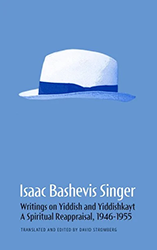Josephus has fascinated readers for thousands of years. He witnessed the last days of the Second Temple as a Jew of the priestly class, and described its vanished rites in Jewish Antiquities. He commanded a brigade in the Jewish revolt against Rome, which provoked the Temple’s destruction, and wrote about it in The Jewish War. Josephus ultimately became a prominent citizen of Rome, after concluding that victory by the Romans was inevitable.
Martin Goodman surveys how The Jewish War has been variously understood over the twenty centuries since it was written. There’s no one better qualified — Martin Goodman is the leading scholar studying Jews of the Roman period, and he combines clear prose with a comprehensive knowledge of primary sources. This is a biography, but not of Josephus; it’s part of a new series from the Princeton University Press which focuses on the “lives” of great religious books like the Analects of Confucius and the Sufi classic, Masnavi, by Rumi.
You may be surprised to learn that Jews didn’t pay much attention to Josephus until eight hundred years after he died. The rabbis who created the Talmud during that timespan were certainly interested in Jewish life in Palestine during the first century CE. But they relied entirely on Hebrew and Aramaic sources rather than the Greek in which Josephus (like Philo) circulated. Meanwhile, the Christian church was eagerly using Josephus’ account of the destruction of the Temple as evidence that God had decisively abandoned the Jews in favor of Christianity.
Josephus’s work came to be used as validation for whatever its disparate readers wanted to believe. A Yiddish version, based on an inauthentic text in Hebrew called Sefer Yossipon, highlighted the glories of the Second Temple. The Jewish heretic, Uriel da Costa, used Josephus to argue against rabbinic Judaism in favor of the “more noble” Sadducees.
More recently, the nineteenth-century German Jewish reformer, Leopold Zunz, found a model in Josephus’ assimilation to Roman ways. Orthodox historians looked to Josephus’ defense of tradition. Early Zionists saw a precedent for Jewish self-determination in his role in the revolt against Rome. The story of the mass martyrdom at Masada, a foundational narrative in modern Israel, was taken indirectly from Josephus.
In short, the meanings of The Jewish War over the course of centuries were mostly in the eyes of the beholder. To follow those varied readings with Goodman is to take an epic journey through time. And his mastery of sources, from classical texts to obscure newspaper articles, gives his fascinating story an unchallenged authority.
Bob Goldfarb is President Emeritus of Jewish Creativity International.





